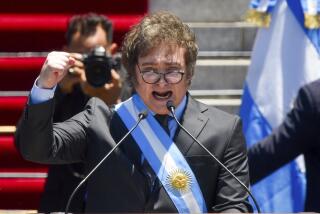Alfonsin Challenges Argentine Military
- Share via
BUENOS AIRES — President Raul Alfonsin, who suppressed the third Argentine army uprising in less than two years earlier this month, on Wednesday challenged the armed forces to respect the constitution and “play by the rules of the democratic system.”
In an address to a rare joint session of Congress, the president directly criticized the military’s past failures to subordinate itself to civilian rule, feeding a cycle of coups and instability.
Alfonsin also made clear that he would not accept the rebellious soldiers’ demand for an amnesty for human rights offenses committed during the anti-terrorism campaign of the military government that ruled from 1976 to 1983. Five former junta members are serving prison terms for directing the campaign, in which at least 9,000 people were arrested and presumed executed.
The majority of Argentines agree that the military made major sacrifices during the so-called dirty war to end left-wing terrorism, Alfonsin said. “But what neither the government nor the people are willing to vindicate is state terrorism,” he declared.
After offering low-key praise for military loyalists in the recent uprising, Alfonsin spoke more forcefully against what he called the arrogance of soldiers and their civilian backers who do not hesitate to challenge democratic authority.
Alfonsin and his ruling party, the Radical Civic Union, have been under attack because of widespread suspicions that the Dec. 1-4 uprising ended with a deal between the rebels and the government.
Alfonsin, who has repeatedly insisted that there was no deal, reiterated that stance Wednesday, saying: “To attempt to make arrogance legitimate or to impose justice to achieve one’s demands is no less an absurdity than to suppose that the government is willing to negotiate in the face of such methods.”
New Chief of Staff
After his speech, the president formally announced the appointment of Gen. Francisco Gassino, director of the armed forces’ teaching institutes, to replace Gen. Jose Dante Caridi as army chief of staff.
Caridi stepped down Tuesday in what was seen as a quid pro quo with the rebels to end the insurrection. The mutineers had wanted Caridi out because he led a purge of senior officers who had been sympathetic to the last two revolts in April, 1987, and last January.
Gassino, chosen over several more senior army generals, had been a firm opponent of the rebellions and not one of the favorites of Col. Mohamed Ali Seineldin, who led the uprising. Thus, Gassino’s appointment was seen as a further sign of Alfonsin’s resolve to re-establish his authority as commander in chief of the armed forces and to not tolerate acts of disloyalty.
The president said the complete public repudiation of the army insurrection, and the near-total rejection of the rebels’ methods by other soldiers, showed there was no encouragement for attempts to press demands at the point of a gun.
Noting that a central demand of the mutineers was the restoration of the military’s honor, the president asked, “What type of respect can be obtained by force?”
He added: “The progressive loss of our sense of juridical norms has been the principal cause of our decadence.”
Opposition legislators remained silent despite frequent bursts of applause during the speech. The Peronists, whose candidate, Carlos Saul Menem, holds a commanding lead in opinion polls for the May 14 presidential elections, expressed agreement with Alfonsin’s principles of not ceding to military demands but questioned the lack of specifics on the uprising itself.
More to Read
Sign up for Essential California
The most important California stories and recommendations in your inbox every morning.
You may occasionally receive promotional content from the Los Angeles Times.













